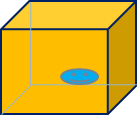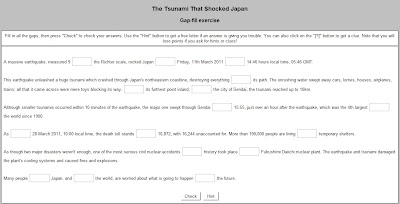In this post, I'll briefly run through the general rules regarding the prepositions at, in and on, and at the end, there is an interactive cloze activity for you to practise on.
Prepositions of place

When we think of a place which has a three-dimensional space, we use IN. Examples are containers, rooms, buildings, vehicles, cities, countries, areas, etc.
I was looking for my keys, and they were in my pocket!
The children are in the garden with their father.
He's got a lovely flat in Paris.
Whenever they get a chance, they go running in the park together.
We use AT when we think of a place as a point.
Whenever I'm in Singapore, I stay at the Goodwood Park Hotel.
 I used to live at 67 Whitehall Park.
I used to live at 67 Whitehall Park.Joni is at the bus stop.
My son is at the station now.
Why don't you call Sue now? I'm sure she's at home.
We use ON when we think of a place as a surface:
Why are you lying on the floor?
I have 17 pictures on my living room wall.
Who was the first man on the moon?
I just love listening to the rain falling on the roof.
To recap:
ON
IN
Let's meet at the bus stop in front of Jack's café on Fifth Avenue.
The cheque is in the white envelope on my desk.
The accident happened at the traffic lights before Jack's café.
Prepositions of time
Let's try to imagine time in terms of lines we spoke of above. Think of longer periods of time as spaces, and remember we use IN when we think of spaces, so we use IN with years, months, weeks, and seasons: in 1992, in October, in the second week of August.
We can also think of periods during the day as 'spaces', so we use in the morning, afternoon and evening.
Think of days, as blobs on a line, so we use ON: on Monday, on 1st April, on Christmas Day.
However, the hour can be imagined as a point in time, so we must use AT: at 5pm, at midnight, at lunchtime.
To study these prepositions in more detail, I suggest you read One Stop English's reference.
Now, try to do this interactive cloze based on the triple disaster (earthquake, tsunami and nuclear threat) that hit Japan earlier this month. Click on the image to begin.






No comments:
Post a Comment
Note: only a member of this blog may post a comment.